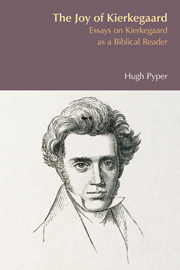Book contents
- Frontmatter
- Contents
- Preface
- Acknowledgments
- Abbreviations
- 1 The Joy of Kierkegaard
- 2 Kierkegaard's Canon: The Constitution of the Bible and of the Authorship in Concluding Unscientific Postscript
- 3 The Apostle, the Genius and the Monkey: Reflections on Kierkegaard's ‘The Mirror of the Word’
- 4 Your Wish Is My Command: The Peril and Promise of the Bible as ‘Letter from the Beloved’
- 5 The Lesson of Eternity: The Figure of the Teacher in Kierkegaard's Philosophical Fragments
- 6 Cities of the Dead: The Relation of Person and Polis in Kierkegaard's Works of Love
- 7 Adam's Angest: The Language of Myth and the Myth of Language
- 8 Beyond a Joke: Kierkegaard's Concluding Unscientific Postscript as a Comic Book
- 9 ‘Sarah Is the Hero’: Kierkegaard's Reading of Tobit in Fear and Trembling
- 10 How Edifying Is Upbuilding? Paul and Kierkegaard in Dialogue
- 11 Forgiving the Unforgivable: Kierkegaard, Derrida and the Scandal of Forgiveness
- Bibliography
- Index of Biblical References
- Index of Authors
3 - The Apostle, the Genius and the Monkey: Reflections on Kierkegaard's ‘The Mirror of the Word’
- Frontmatter
- Contents
- Preface
- Acknowledgments
- Abbreviations
- 1 The Joy of Kierkegaard
- 2 Kierkegaard's Canon: The Constitution of the Bible and of the Authorship in Concluding Unscientific Postscript
- 3 The Apostle, the Genius and the Monkey: Reflections on Kierkegaard's ‘The Mirror of the Word’
- 4 Your Wish Is My Command: The Peril and Promise of the Bible as ‘Letter from the Beloved’
- 5 The Lesson of Eternity: The Figure of the Teacher in Kierkegaard's Philosophical Fragments
- 6 Cities of the Dead: The Relation of Person and Polis in Kierkegaard's Works of Love
- 7 Adam's Angest: The Language of Myth and the Myth of Language
- 8 Beyond a Joke: Kierkegaard's Concluding Unscientific Postscript as a Comic Book
- 9 ‘Sarah Is the Hero’: Kierkegaard's Reading of Tobit in Fear and Trembling
- 10 How Edifying Is Upbuilding? Paul and Kierkegaard in Dialogue
- 11 Forgiving the Unforgivable: Kierkegaard, Derrida and the Scandal of Forgiveness
- Bibliography
- Index of Biblical References
- Index of Authors
Summary
In Ezek 33:30-2 the prophet is given this rather disheartening warning (NEB):
Man, your fellow countrymen gather in groups and talk of you under walls and in doorways and say to one another, ‘Let us go and see what message there is from the Lord.’ So my people will come crowding in, as people do, and sit down in front of you. They will hear what you have to say but they will not do it. ‘Fine words!’ they will say, but their hearts are set on selfish gain. You are no more to them than a singer of fine songs with a lovely voice, or a clever harpist; they will listen to what you say but will certainly not do it.
There in a nutshell is the problem of the religious author, the problem that Kierkegaard constantly confronts in his own work. The more skill such an author uses to catch people's attention and the more graphically he or she describes for them the awesome possibilities of the religious transformation, the more scope there is for the audience's attention to be devoted to the aesthetic titillation to be gained from contemplation of these possibilities as fantasies. In Kierkegaard's analysis, it is this flight from the realization of possibility which is at the heart of the aesthetic attitude.
- Type
- Chapter
- Information
- The Joy of KierkegaardEssays on Kierkegaard as a Biblical Reader, pp. 32 - 42Publisher: Acumen PublishingPrint publication year: 2012



